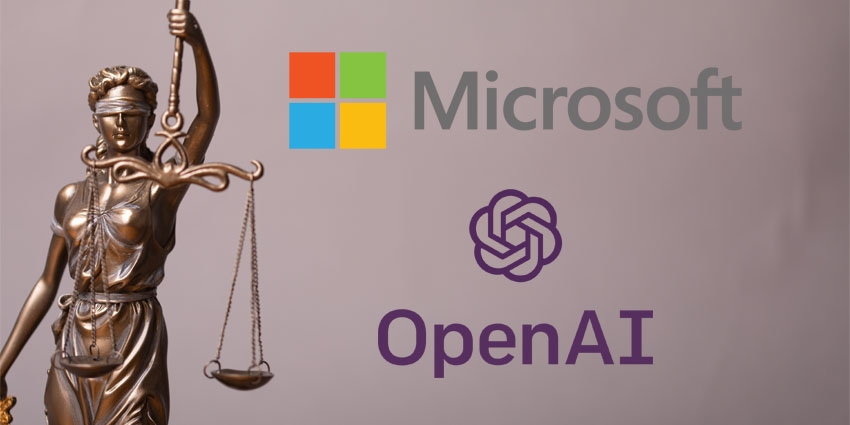The Federal Trade Commission (FTC) and Justice Department are reportedly in discussions over which agency can investigate OpenAI’s relationship with Microsoft.
As reported by Politico, the FTC and Justice Department opened talks several months ago to assess which one can initiate an antitrust probe into the issue. However, neither regulatory body wants to concede jurisdiction to the other — a contention that must be addressed before any official investigation into OpenAI and Microsoft can begin.
The debate stems from which agency can probe which businesses which (allegedly) illegally extract content to build and train their AI models. The discussion is reportedly centred on OpenAI and Microsoft specifically rather than an industry-wide, precedent-setting discussion about which agency can investigate OpenAI antitrust issues moving forward.
The basis for an antitrust investigation, as reported by Politico, is the ambiguity of Microsoft and OpenAI’s relationship.
Microsoft has invested around $13 billion in OpenAI over the past four years, but these mooted probes arrive two months after November’s dramatic OpenAI saga, in which its CEO Sam Altman was ousted by its board before being reinstated just four days later following intense pressure from both employees and investors.
Over 700 of OpenAI’s 770 workers said they would resign unless Altman was allowed to return, while Microsoft, as OpenAI’s largest investor, exerted pressure on OpenAI’s board.
Microsoft released a statement two days after Altman’s sacking that the tech giant had hired both Altman and his OpenAI Cofounder Greg Brockman to manage a new AI research team. In an open letter to their board, the 700-strong group of OpenAI employees said that Microsoft had promised them jobs if they followed through on their threat of resigning.
After Altman’s return, Microsoft CEO Satya Nadella was vocal about the need to improve OpenAI’s governance. Microsoft also since secured a nonvoting position on OpenAI’s board.
Because businesses have to report most deals to a federal antitrust regulator, it raised eyebrows that OpenAI and Microsoft have not yet done so. Microsoft has stated it has no power over OpenAI governance or strategy, but its conduct following Altman’s firing has brought that relationship into the spotlight.
Microsoft and OpenAI’s Dynamic Under the Microscope
The FTC and Justice Department aren’t the first antitrust organisations to ponder a formal investigation of OpenAI and Microsoft.
Just before Christmas, across the pond, the UK’s Competition and Markets Authority (CMA) announced it was probing Microsoft and OpenAI’s relationship.
Following November’s melodrama, the CMA delivered an Invitation to Comment to both tech companies, which comprises the first part of the CMA’s information-gathering initial review and is posted before initiating an official phase one investigation. The regulatory body asked Microsoft, OpenAI, and any other relevant third party whether “recent developments” had seen the partnership expand into a “relevant merger situation”.
The CMA further explained it would “review whether the partnership has resulted in an acquisition of control,” which the organisation defines as when one party has “material influence, de facto control or more than 50 percent of the voting rights over another entity – or change in the nature of control by one entity over another”.
OpenAI’s 2024 So Far
It’s been a busy start to the year for OpenAI.
Bloomberg reported that the company was in discussions for a new round of funding valued at $100 billion or higher, albeit the terms, valuation, and timing for the funding round were yet to be completed and remained subject to potential adjustments.
Bloomberg added that OpenAI was set to finalise a further agreement with its second-largest investor, Thrive Capital, which the report suggested would allow OpenAI employees to sell shares valued at $86 billion. OpenAI previously enacted a $300 million share sale valued at $30 billion.
This month, OpenAI also launched ChatGPT Team, a paid subscription service for its AI platform targeting SMBs.
Positioned between ChatGPT Plus (for individuals) and ChatGPT Enterprise (for large businesses), ChatGPT Team retains many of the latter’s features.
The subscription features access to the up-to-date GPT-4 large language model (LLM) and DALL-E 3 image generator, secure control over business data, the functionality to create custom GPTs, shared workspace, an admin console for workspace and team management, advanced data analysis, and early access to new features and improvements. ChatGPT Team is designed for teams of 150 users or less.
Pricing begins at $25 per user per month when billed annually and $30 per user per month when done so monthly.







